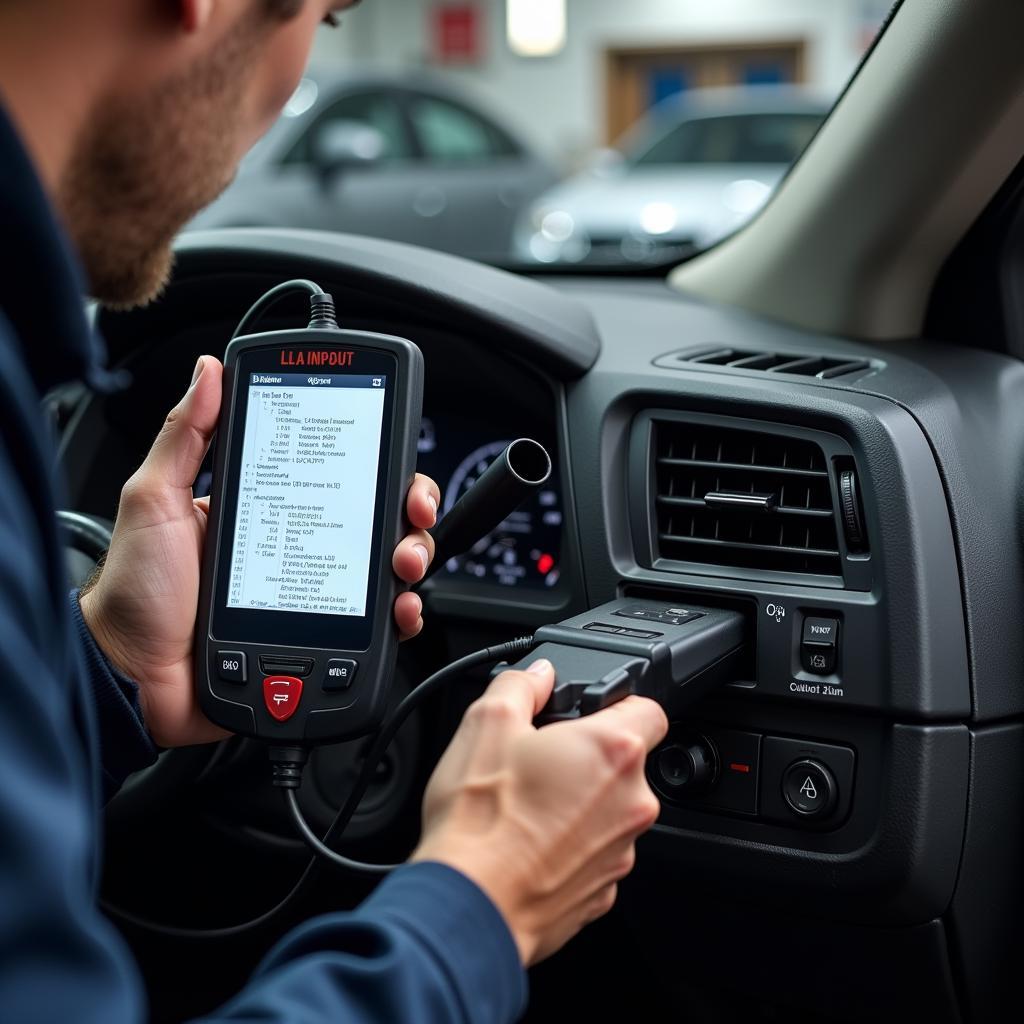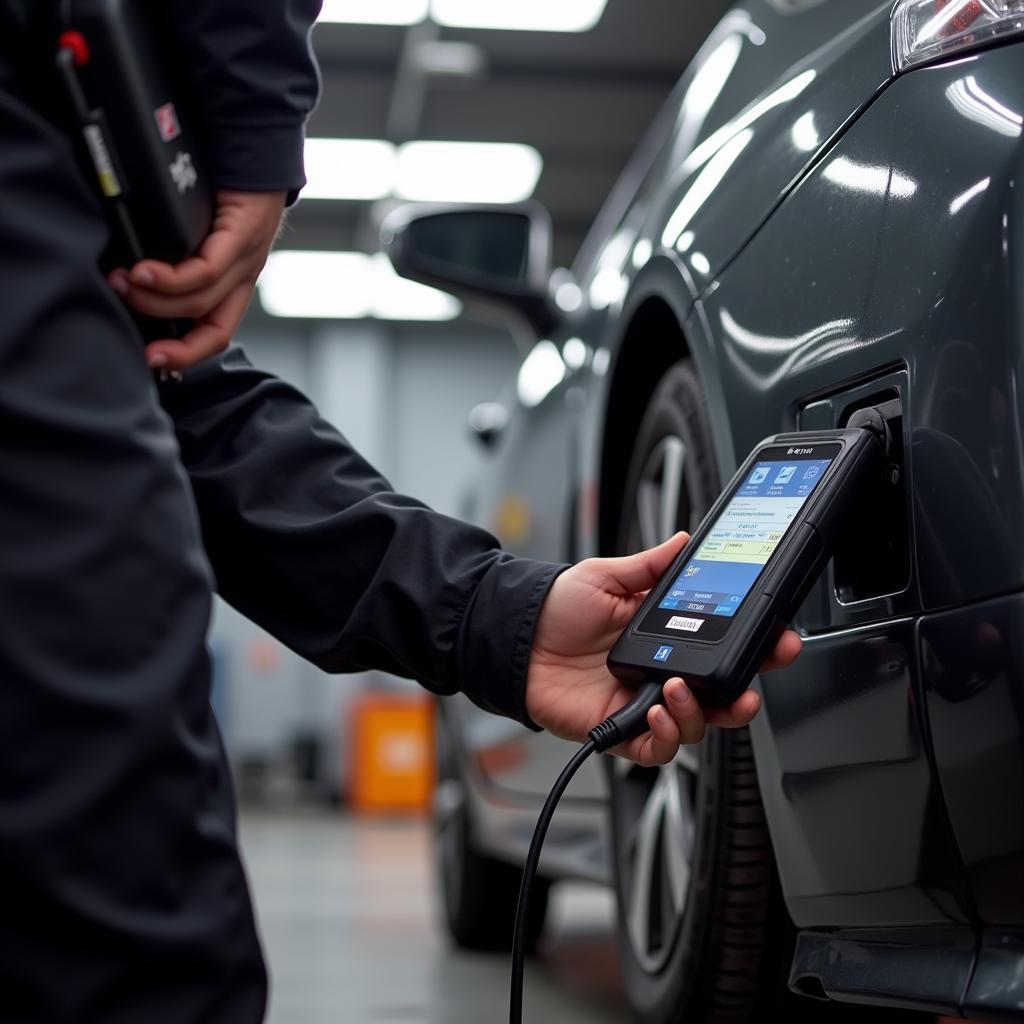Diagnostic Tools For Automotive repair have revolutionized the way mechanics troubleshoot and fix vehicles. No longer do we rely solely on experience and intuition; today’s sophisticated tools provide precise data, enabling faster, more accurate diagnoses and ultimately saving time and money. This guide explores the world of automotive diagnostic tools, covering everything from basic code readers to advanced scan tools and software.
After identifying a potential issue with your vehicle, diagnostic tools can help pinpoint the problem. Using must have pc diagnostic tools can significantly improve the efficiency and accuracy of the diagnostic process.
Why Are Diagnostic Tools for Automotive Important?
Modern vehicles are complex networks of interconnected systems controlled by electronic control units (ECUs). When something goes wrong, these ECUs store diagnostic trouble codes (DTCs). Diagnostic tools allow mechanics to access these codes, interpret them, and identify the faulty component or system. This eliminates guesswork, reduces diagnostic time, and prevents unnecessary repairs.
What Types of Automotive Diagnostic Tools are Available?
Several categories of diagnostic tools for automotive exist, each designed for specific tasks and levels of expertise. Understanding these differences is crucial for choosing the right tool for your needs.
Code Readers
Code readers are entry-level diagnostic tools designed to retrieve and display DTCs. They are relatively inexpensive and easy to use, making them a popular choice for DIY enthusiasts. However, they offer limited functionality and may not provide detailed information about the cause of the problem.
Scan Tools
Scan tools are more advanced than code readers, offering a wider range of functionalities. They can read and clear DTCs, display live data streams from various sensors, perform actuator tests, and even program certain modules. Scan tools are essential for professional mechanics.
Oscilloscopes
Oscilloscopes are powerful diagnostic tools that allow mechanics to visualize electrical signals within the vehicle’s systems. They are invaluable for diagnosing complex electrical problems and intermittent faults that may not trigger DTCs.
Multimeters
Multimeters are essential tools for measuring voltage, current, and resistance in various electrical circuits. They are vital for diagnosing wiring issues, sensor malfunctions, and other electrical problems. Knowing how to use a multimeter effectively is a fundamental skill for any automotive technician.
How to Choose the Right Diagnostic Tools for Automotive?
Selecting the appropriate diagnostic tools for automotive depends on several factors, including your budget, skill level, and the types of vehicles you typically work on.
Consider Your Budget
Diagnostic tools range in price from affordable code readers to high-end scan tools costing thousands of dollars. Set a realistic budget and choose tools that offer the best value for your money.
Assess Your Skill Level
If you’re a DIY enthusiast, a basic code reader or an OBD-II scanner might suffice. Professional mechanics, however, require more sophisticated tools with advanced functionalities.
 Mechanic Diagnosing Car with Scan Tool
Mechanic Diagnosing Car with Scan Tool
Think About Vehicle Compatibility
Ensure that the diagnostic tools are compatible with the make, model, and year of the vehicles you intend to diagnose. Some tools are designed for specific vehicle manufacturers, while others are more universal.
“Investing in the right diagnostic tools is not just about fixing cars; it’s about building a successful and sustainable automotive business,” says John Davis, a seasoned automotive engineer with over 20 years of experience.
What are the Benefits of Using Diagnostic Tools for Automotive?
Using diagnostic tools for automotive offers numerous benefits, including increased efficiency, improved accuracy, and reduced repair costs.
Increased Efficiency
Diagnostic tools can quickly pinpoint the source of a problem, eliminating the need for time-consuming trial-and-error methods. This saves valuable time and allows mechanics to service more vehicles.
Improved Accuracy
By providing precise data, diagnostic tools minimize the risk of misdiagnosis and unnecessary repairs. This leads to more accurate repairs and greater customer satisfaction.
windows memory diagnostic tools are useful for identifying memory problems that can affect the performance of diagnostic software.
Reduced Repair Costs
By accurately identifying the faulty component, diagnostic tools can help prevent unnecessary parts replacement and labor costs. This ultimately saves money for both the mechanic and the vehicle owner.
“In today’s fast-paced world, time is money. Diagnostic tools help us save both,” emphasizes Maria Sanchez, a leading automotive technician and instructor.
Future Trends in Automotive Diagnostic Tools
The field of automotive diagnostics is constantly evolving. Emerging technologies like artificial intelligence (AI) and machine learning are poised to further revolutionize the way vehicles are diagnosed and repaired. Expect to see more sophisticated diagnostic tools with predictive capabilities and advanced data analysis features.
Conclusion
Diagnostic tools for automotive are essential for any modern mechanic or car enthusiast. They offer a wide range of benefits, from increased efficiency and accuracy to reduced repair costs. By understanding the different types of tools available and choosing the right one for your needs, you can significantly improve your diagnostic capabilities and stay ahead of the curve in the ever-evolving automotive industry. Need help with choosing the right tools? Connect with ScanToolUS at +1 (641) 206-8880 or visit our office at 1615 S Laramie Ave, Cicero, IL 60804, USA. We’re here to help!
command prompt diagnostic tools can be used alongside other diagnostic tools to provide a comprehensive analysis of the vehicle’s systems.
FAQs
- What is an OBD-II port? The OBD-II port is a standardized connector found in most vehicles manufactured after 1996. It allows diagnostic tools to access the vehicle’s computer and retrieve data.
- What are diagnostic trouble codes (DTCs)? DTCs are codes stored by the vehicle’s computer when a malfunction is detected. Diagnostic tools can read these codes to identify the problem.
- Do I need a professional scan tool if I’m a DIYer? A basic code reader may suffice for simple diagnostics, but a professional scan tool offers more advanced functionalities and is recommended for more in-depth troubleshooting.
- How often should I use diagnostic tools? It’s recommended to use diagnostic tools whenever a warning light illuminates or you suspect a problem with your vehicle.
- Can diagnostic tools fix my car? Diagnostic tools help identify problems but don’t fix them. They provide information to guide repairs.
- Are there diagnostic tools for specific vehicle makes? Yes, some diagnostic tools are designed for specific vehicle manufacturers and offer more specialized functionalities.
- Where can I learn more about using diagnostic tools? Numerous online resources, training courses, and manuals provide detailed information on using various diagnostic tools.
design genetic diagnostic tools is a different field, however, accurate diagnostics is key in many fields. Similarly, dns diagnostic tools are used for network troubleshooting. Just as in automotive diagnostics, accurate tools are crucial for resolving any technical issue efficiently.



Pingback: Best Professional Car Diagnostic Tool for the Money - Car Scan Tool